Elvis Presley’s army service began at the height of his fame, when he was drafted at age 23. It was a turbulent time for him and his fans back home. Given his worldwide celebrity as a rock ’n’ roll sensation, with multiple chart-topping hits and four films to his credit, Elvis could have got away with a ‘special services’ commission, sometimes known back then as ‘a celebrity wimp-out’, entertaining troops and boosting morale. But his ever-canny manager, Colonel Tom Parker, saw an opportunity…
Colonel Tom Parker thought that by ensuring the public saw Elvis serving as a regular soldier it would clean up his client’s image and transform him from a provocative teen idol into a more durable performer appealing across the generations.
If Elvis balked initially at being taken out of his comfort zone, he could see that a change of scene – his entire two years’ service was to be spent in Germany – would be no bad thing after 24 dizzy months of mayhem. In one interview at the time he joked, “The Army will be a relief.”
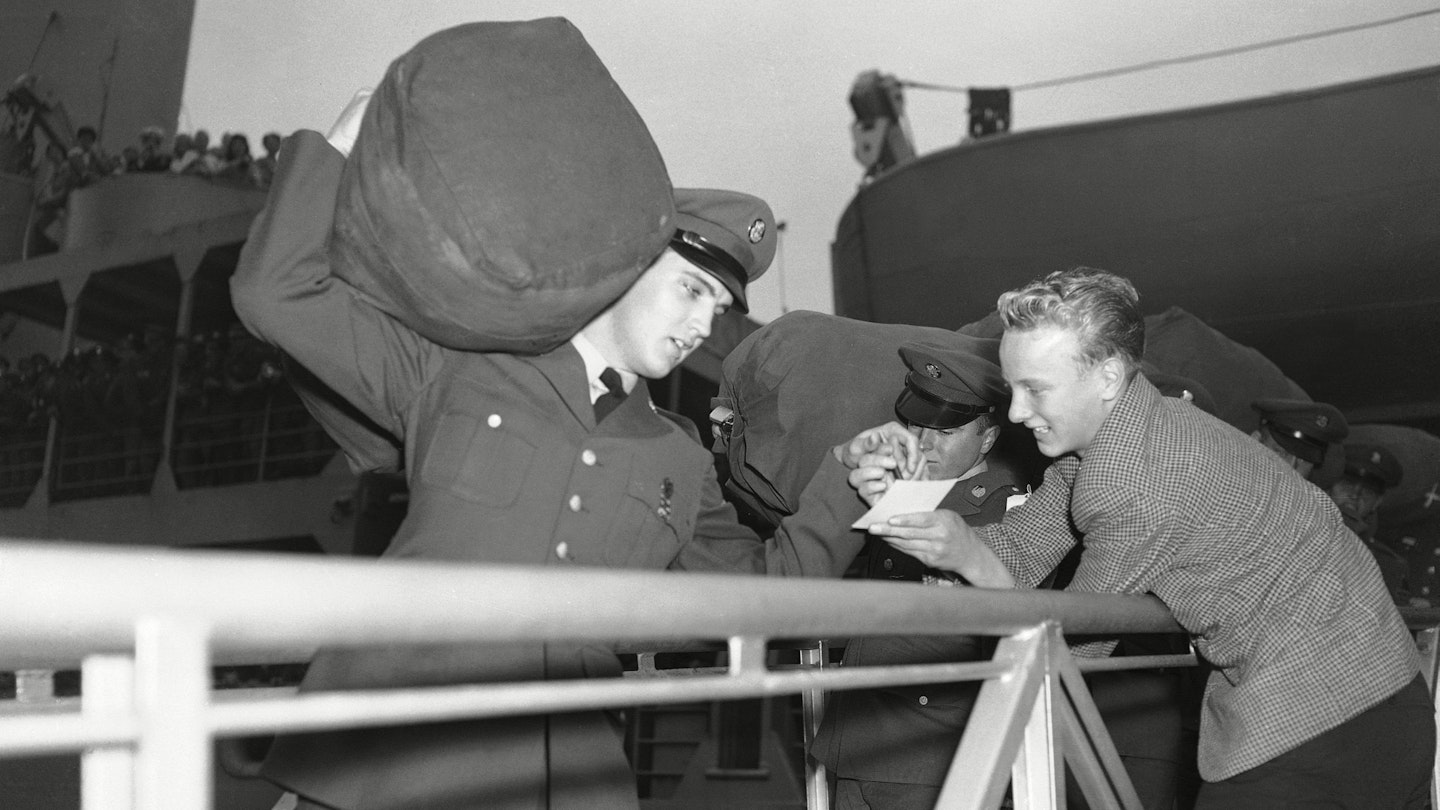
Elvis’ entourage
To all outward appearances, Elvis would be a regular GI Joe, undergoing basic training in the US prior to being posted to a combat unit in what was then West Germany. Though he’d be unlikely to see active service, this was at the height of the Cold War (the state of open hostility between the US and the Soviet bloc) so nobody could say exactly how it would pan out.
The high-spirited antics of Elvis and his chums actually got them chucked out of the hotel, but Elvis was determined to keep them by his side, rather than send them home. He said in an interview: “When I really think about it (Red and Lamar) aren’t just my protection against aggressive fans. I also don’t like being alone and their presence gives me a feeling of stability.”
It was a turbulent time for Elvis as his much-loved mother Gladys died, aged 46, just four months into his military training. Hating to be alone, he insisted on being accompanied to Germany by his father, Vernon, his grandmother, Minnie Mae, and two old school friends, Red West and Lamar Fike, who were loosely classed as the singer’s bodyguards. The Army agreed they should live together off-base, initially in a hotel suite and later at a rented house in Bad Nauheim, 27 miles north of Frankfurt, and a short drive to the Army base.
Elvis continued to keep his old friends close by throughout his life – they became known as ‘the Memphis Mafia’ – because he could trust them and they knew how to lift his spirits when he was down.
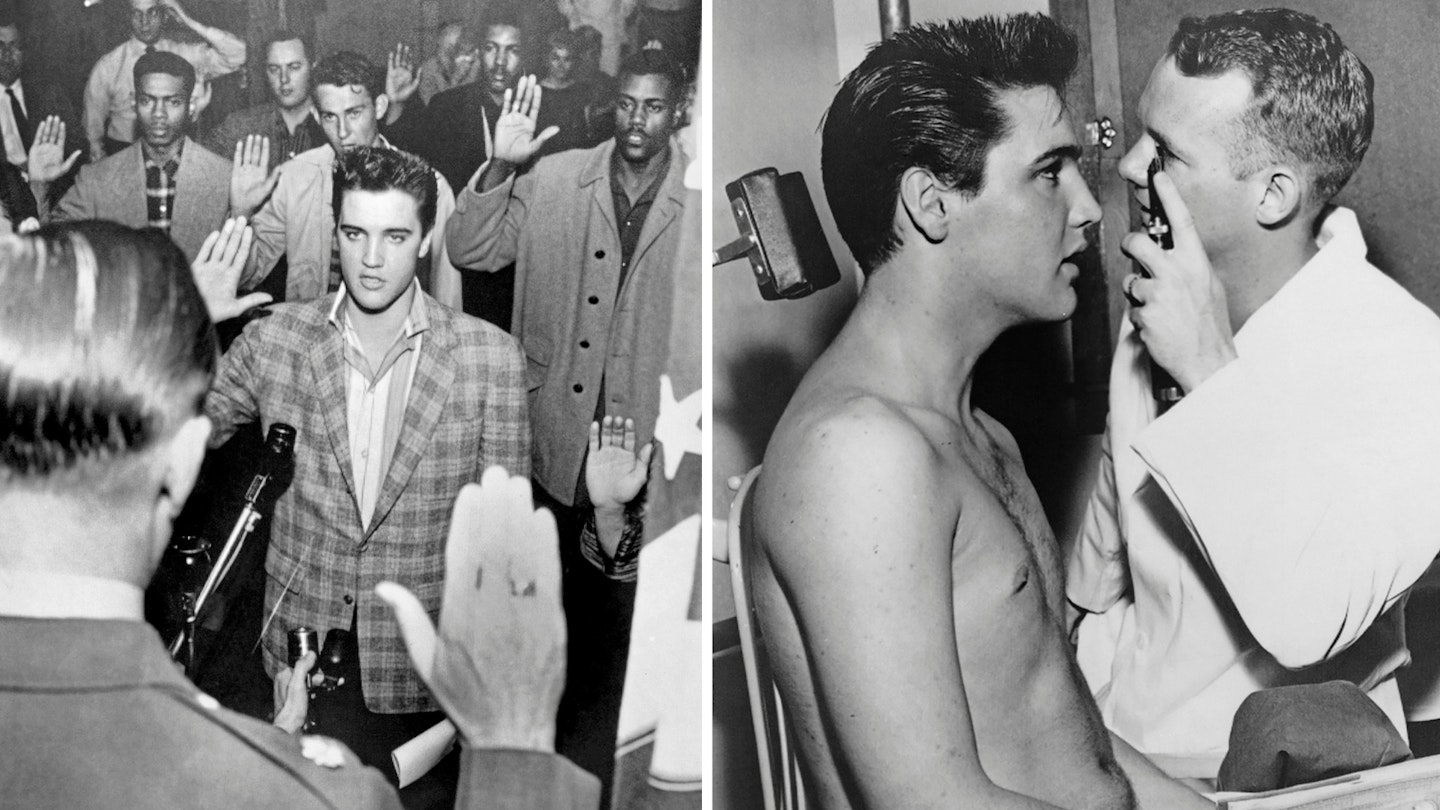
Battle plans
If Elvis thought being based in Germany would quell the ever‑present teenage delirium, he was mistaken. His arrival in Bremerhaven on October 1, 1958 was greeted by 1500 swooning fans, mostly girls, as well as a bunch of journalists and photographers.
One military journalist wrote at the time: “The Army is torn between a desire to keep Elvis locked out of sight and a half-concealed wish that he had enlisted in the Navy or the Air Force. Everywhere Elvis has gone the Army has been forced to make battle plans to keep the peace. Presley is far bigger than his company commander, bigger than the generals who watch over him, and the sooner the Army gives in to this truth, the sooner the furore will die down and everybody can get back to work.”
How on earth the Army ever imagined such a global superstar would fit in to the anonymity and regulation of military life is a mystery, but it says a lot for Elvis’ character that he somehow managed to steer a middle course between dealing with the hordes of female fans waiting round every corner and fulfilling his duties as Private Presley.
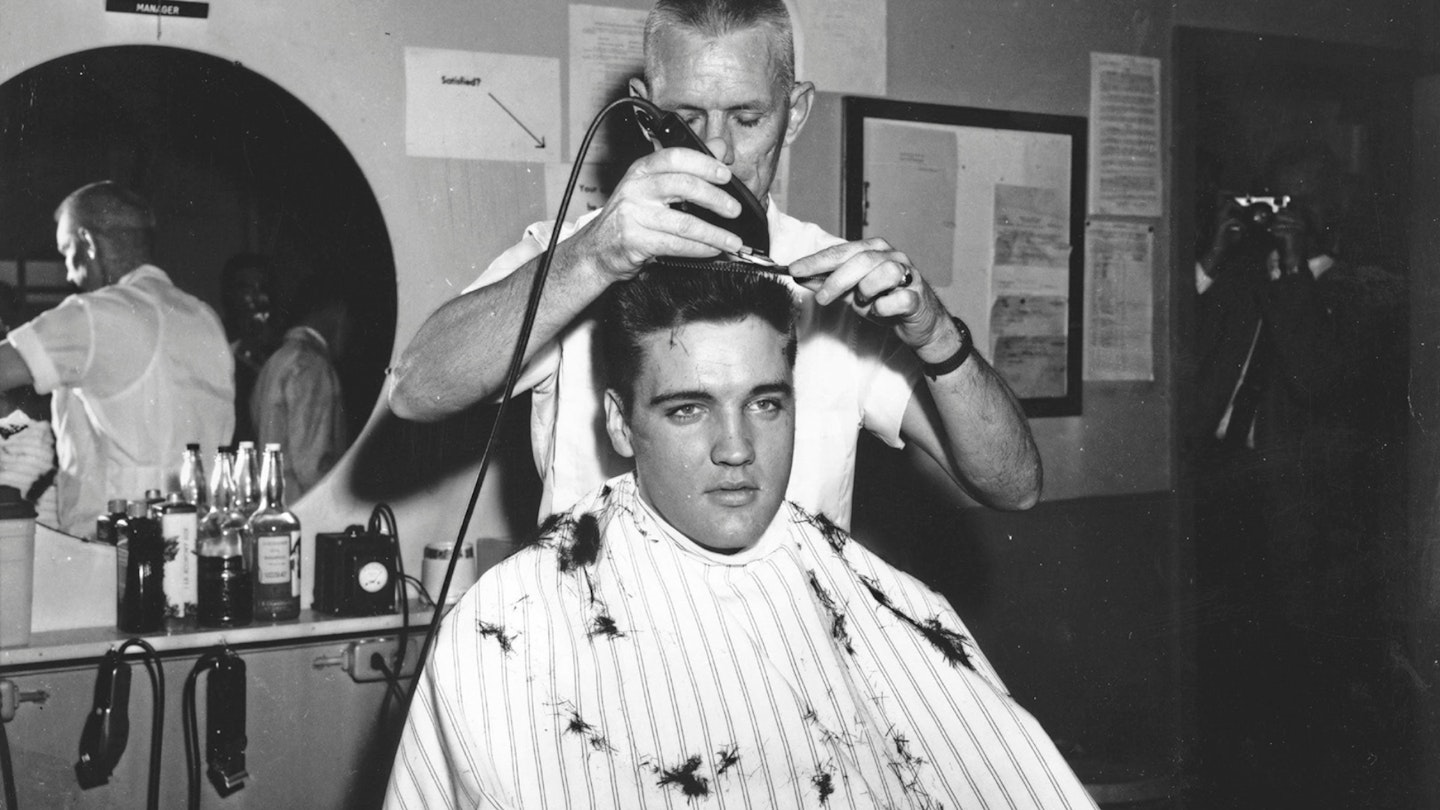
His first assignment was driver to one Captain Russell, commander of a tank battalion, who found the unwanted attention from fans extremely difficult to deal with. Elvis was then assigned to Sergeant Ira Jones, a Korean war veteran, who “didn’t take any junk from anybody”. He and Elvis hit it off and the tough-nut Jones took the fresh-faced young recruit under his wing.
Unsurprisingly, Elvis was less enamoured of night-time field training manoeuvres in often wet and freezing conditions. He got through it with the camaraderie of his fellow GIs and amphetamines, freely available in the US Army at the time. Elvis had experimented with ‘uppers’ before entering the Army, mostly on prescription, but their easy accessibility hastened his dependency. Nobody cautioned about the dangers of addiction.
The fans could be a blessing and a curse. On one occasion, while on solitary guard duty at night, a group of fans appeared from nowhere. Elvis didn’t mind but it wasn’t the Army’s idea of sentry duty. Reinforcements had to be sent to disperse the crowd. He was never put on guard duty again.
Colonel Parker wrote to Elvis several times a week about the various deals he’d made with RCA and Twentieth Century Fox to ensure that the singer’s return to public life would go as smoothly – and profitably – as possible. Parker also engineered the press coverage Elvis received while overseas, both favourable and unfavourable. Parker understood like nobody else that there was no such thing as bad publicity. He was the original marketing maestro.
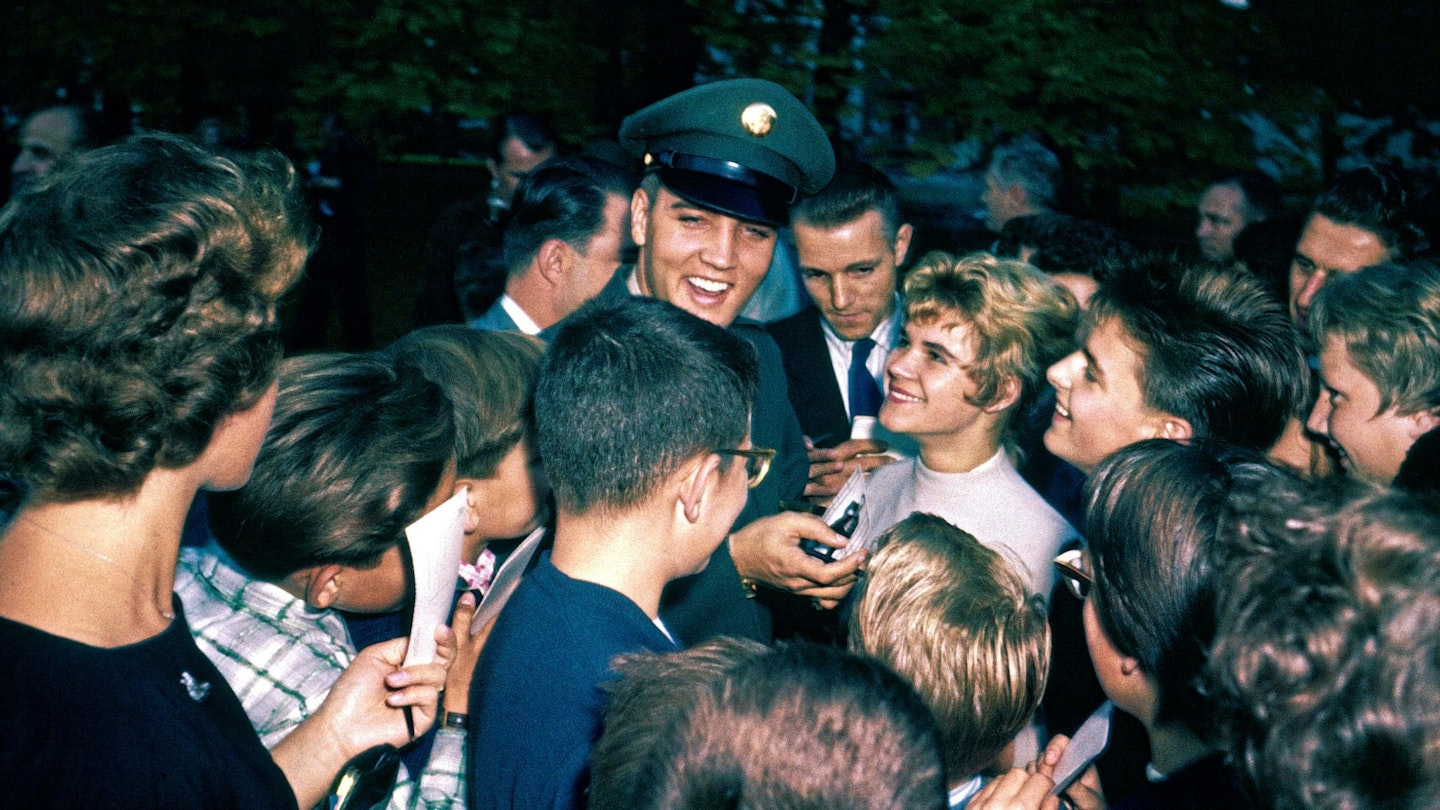
Adoring fans
Elvis frequently provoked havoc simply by turning up unannounced at a local bar or grocery store – ‘Elvis the Traffic Obstacle’ ran one local newspaper headline in 1959 after he stopped his car to sign autographs in a busy shopping area. However, he proved as popular with the German press as he was with the country’s youth. “We think he’s a great guy,” wrote one columnist. “He greets us reporters with a smile and a wave of the hand, places himself in our midst and answers all of our questions. His appearance hardly differs to that of the other soldiers in the camp. Just two sparkling rings give him away as the best paid US soldier.”
We know from his letters to friends that Elvis wasn’t always brimming with positivity about his experiences as a GI, but he made time for fans who would congregate outside the Presley residence to catch sight of their hero as he came and went. He even instructed a sign to be put up outside the house stating times when he would be available to sign autographs.
“Elvis was an idol, but he was also a very polite, courteous young man,” one of his young German male fans is quoted as saying in Trina Young’s book, Elvis: The Army Years Uncovered. “He had no starry airs, gave everyone autographs, and was there for his fans, allowing himself to be photographed with everyone.”
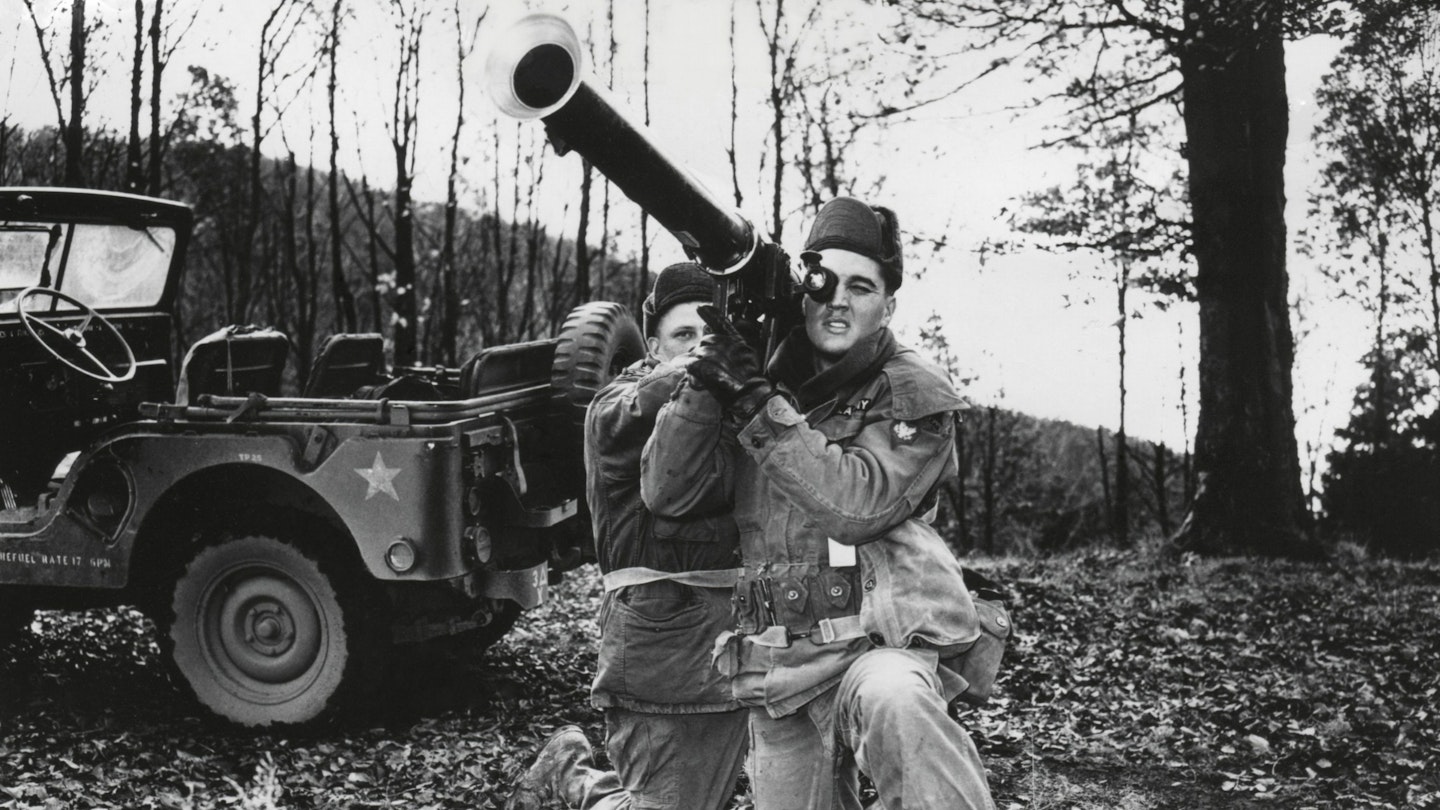
Inevitably there was an element of sour grapes among some of Elvis’ fellow soldiers. Robert McDaniel resented the singer’s off-base living quarters, home cooking, special medical attention and steady supply of adoring girlfriends. Another noted that Elvis was exempted from shouting the customary “No, sir!” and “Yes, sir!” every time he addressed an officer on the grounds that it would damage his throat.
Parker’s rules and Elvis' secret army gigs
Colonel Parker made it clear to Elvis from the start that he was forbidden from performing while he was in Germany – a tall order given who he was and the constant pressure from the fans. Everywhere he went Elvis was asked to sing. He told them he wasn’t allowed to sing in public while serving in the Army.
However, singing in private was different. On one occasion, accompanying himself on a piano, he and Sergeant Ira Jones treated a bemused German cleaner to a string of his hits in an empty officers’ club room. And at a crowded farewell party for Sgt. Jones, Elvis performed an hour-long medley of his greatest hits, including Hound Dog which he dedicated to his friend Ira Jones, whom he nicknamed ‘Wild Bill’. Afterwards, Jones told a friend, “I’ve never had so much fun in all my life.”
There were other ‘secret’ gigs including one in a local bar where he sang without a microphone for more than two hours. If it had been today, dozens of mobile phones would have been recording every moment, but in 1959 the only means of capturing the moment was the human memory. Nobody who was there ever forgot.
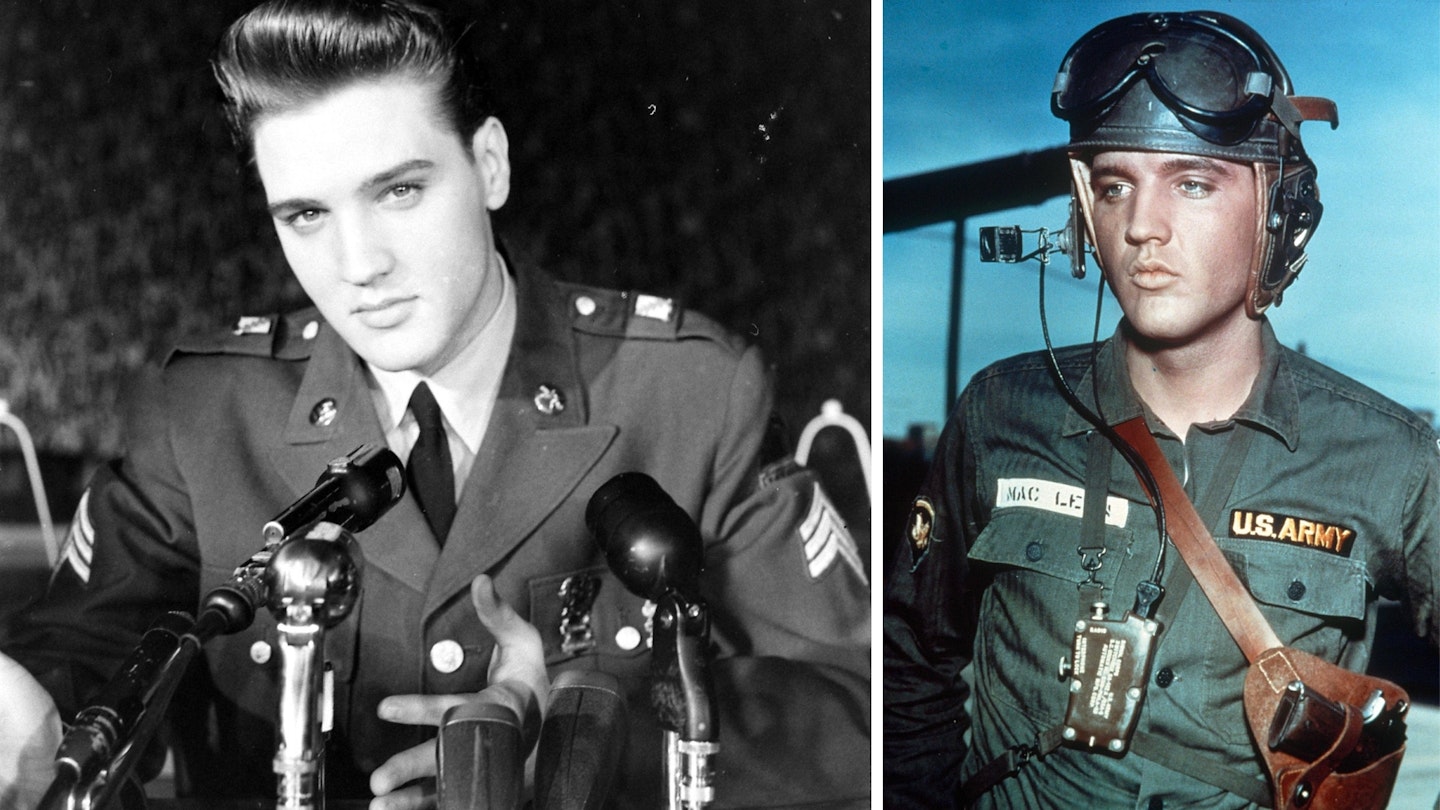
What started out as a mixed blessing for Elvis finished up being a life-changing experience. He said later, “It came at a time when I sorely needed a change. The Army took me away from myself and gave me something different. I learned a lot and I made a lot of friends that I never would have made otherwise.”
It also hardened his resolve to become an all-round entertainer like his role model, Frank Sinatra, with acting being as important in his career as singing.
As for the Army’s verdict on Sergeant Presley, as he became, his platoon leader William J. Taylor wrote, “He was one of us. He cared about us. And he got back the respect and friendship he gave everyone else. I saw sparks of leadership in Elvis that made me think he could have induced men to follow him into combat, just as his music caused millions of young people to follow him.”
Elvis celebrated his return to civvy street with the semi-autobiographical film G.I. Blues (1960), in which he appeared on screen in his Army uniform and sang in German for the first time. His version of the charming German folk song, Wooden Heart, was a worldwide hit and remained in the UK charts for 27 weeks.
